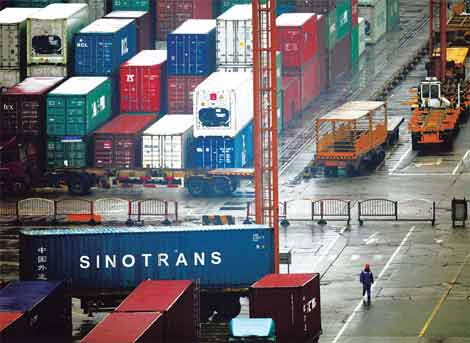Nation 'unlikely' to reduce export rebates
Updated: 2011-01-28 12:38
By Ding Qingfen (China Daily European Weekly)
China expects to maintain the stability of its export-related policy and it is "highly unlikely" that the country will reduce export rebates for highly polluting and energy-intensive industries "during the first half", a senior Ministry of Commerce official says.
The Economic Information newspaper reported that a number of Chinese ministries are mulling over reducing and canceling export-tax rebates on selected products which are highly polluting and energy-intensive, but a senior official from the Ministry of Commerce in charge of drafting export-related policies says such a decision will not come any time soon.
"While it is still not clear when the global economy will fully recover, China will try to maintain continuity and stability in its foreign trade policies," the official says on condition of anonymity.
"We will not take any sort of measures in the first quarter, or even the first half of the year, if there are no signs of an entrenched recovery in the global economy," he says.
Citing an unnamed source, the Economic Information said new tax-rebate measures will probably cover several categories including rubber, steel and materials for construction, although the rate of any rebate was not disclosed. The newspaper said the ministries have finished preliminary research work, but did not outline when the authorities will launch concrete proposals.
"Deciding on a timetable is fairly complicated, as many factors, such as the trend of China's exports, have to be taken into consideration," the report said.
|
 The Ministry of Commerce said there is no immediate plan to launch more tax rebate policies.[Reuters] |
Last June, China announced it would scrap tax rebates on some 406 categories of exported products, especially in polluting and energy-intensive industries, a move which signaled a shift in the country's economic development pattern in favor of "green" growth.
As part of its 12th Five-Year Plan (2011-2015), the State Council said China will strengthen efforts to become a more environmentally friendly and energy- and resource-saving economy.
But as external demand is still fragile and many uncertainties exist, including the rising costs of labor and raw materials and possible yuan appreciation, "the stability of export and relevant policies is the most important of all", says Long Guoqiang, a senior trade expert at the Development Research Center of the State Council. "There will be more advantages than disadvantages if we can maintain it (policy stability)."
Song Hong, a senior researcher on international trade from the Chinese Academy of Social Sciences, says: "A reduction in tax rebates would restrict production and exports of environmentally polluting and energy-intensive goods. China must implement change in a steady but stable manner since any small move will have a fairly big impact on the profitability of the industries involved."
China's foreign trade reached a record high of $2.9 trillion in 2010, up 34.7 percent year-on-year, and exports grew by 31.3 percent year-on-year to $1.58 trillion. Experts predict that export growth will slow to 15 or 20 percent this year.
Chen Deming, the minister of commerce, also said at the annual commerce conference in December that China's exports will be challenged by the European debt crisis, currency revaluation expectations and the rising price of commodities this year.
"China will try to stabilize exports and strike more balanced trade," Chen said.
China's monthly trade surplus has remained high, at about $20 billion, since the second half of 2010. That has provided some foreign nations, including the United States, with ammunition to pressure China to allow its currency to rise, despite the country's moves to narrow its surplus gradually this year as more measures to promote imports are under way.
Adjustments - whether a rebate increase or reduction - will be implemented if the trade situation changes, says the Ministry of Commerce official.
"If the trade surplus is large enough and stable global economic growth is maintained, China will make the appropriate adjustments to the tax-rebate policies," he says.
E-paper

Pearl paradise
Dreams of a 'crazy' man turned out to be a real pearler for city
Literary beacon
Venice of china
Up to the mark
Specials

Power of profit
Western companies can learn from management practices of firms in emerging economies

Foreign-friendly skies
About a year ago, 48-year-old Roy Weinberg gave up his job with US Airways, moved to Shanghai and became a captain for China's Spring Airlines.

Plows, tough guys and real men
在这个时代,怎样才"够男人"? On the character "Man"
